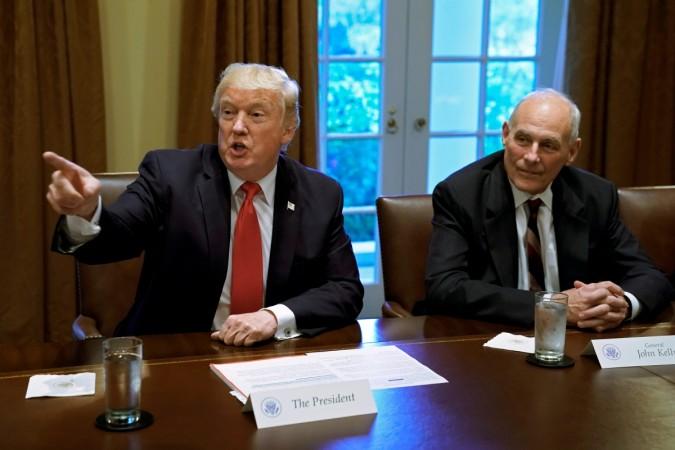
It's a fairly politically incorrect thing to say that US President Donald Trump is right. Unless you are an unapologetic Trump parasite, unless you don't mind being looked at as a chimera. He can't be right. Dyed in the wool Republicans spurn him now. Early converts loathe him and those who were ardent followers once see him now as a two-legged abomination.
Yet, Trump is right. More than most of his predecessors in some cases. In Afghanistan, for example. No other US president has put a finger on the real cause of the Afghan scourge and taken biting corrective action. No sloppy speeches, no humbug from Trump, just some sensible action.
The import of Trump's midnight tweet on the New Year is all too visible with the Afghan Taliban going on a killing spree in the early days of 2018.
"The United States has foolishly given Pakistan more than 33 billion dollars in aid over the last 15 years, and they have given us nothing but lies & deceit, thinking of our leaders as fools. They give safe haven to the terrorists we hunt in Afghanistan, with little help. No more!" Trump said in his first tweet of 2018.
Afghanistan suffered another vicious Taliban attack on Monday, the third large-scale attack in less than 10 days. The Taliban attack on an army base in Kabul killed at least 11 soldiers and injured many more. Days ago a deadly ambulance bomb in Kabul claimed more than 100 lives. The latest surge in Taliban attacks started with the spectacular January 20 attack on the Intercontinental hotel that killed 22 people.
Despite more than 16 years of the US military presence in Afghanistan, the Taliban militants have thrived with the open support of Pakistan. And Afghanistan is not the only victim of the continued carnage.
According to icasualities.org, as many as 2,408 US soldiers died in Afghanistan in the ongoing Operation Enduring Freedom. The total number of coalition soldiers who died there is 3,546. US military presence in Afghanistan has been trimmed over the years with the current number hovering above 8,000.
Pak complicity in Taliban terror run
No US president has been more vocal than Trump in calling out Pakistan's shameless complicity in the Taliban's murderous terror regime.
After the 9/11 attacks, President George W Bush turned to Pak help and designated the country as a major non-Nato ally, leading to a free-flow of economic aid in addition to overt and covert military support. President Obama apparently understood the folly of keeping total faith in Pakistan but the civilian financial aid continued to flow freely.
All the while, Pakistan deftly played the part of the true partner in counter-terror operations. Whenever it was challenged over its anti-terror credentials, Pakistan always offered a counter-narrative, saying it's been as much a victim of terror as Afghanistan.
The fact, however, remains that without Pakistani military and intelligence establishment's patronage, the Afghan Taliban wouldn't exist today.
Why Pakistan wants Taliban to thrive
The Taliban are thriving and going more vocal and visible with daring attacks. Because Pakistan wants the Taliban to exist and thrive. For manifold reasons. First and foremost, Pakistan needs a resurgent Taliban to keep the Afghan government off balance. Pakistan needs the Taliban to checkmate India in Central Asia. It needs the Taliban to destabilise an Indo-Afghan-Iran gas pipeline and other trade channels that India might leverage on.
It also needs a strong Taliban to fend off India from exerting influence on Balochistan. It fears that a strong and stable Afghanistan would mount a challenge for Balochistan. Or at least a covert operations aided by hostile India. Because Balochistan is a key element in the long-running tussle between Afghanistan and Pakistan.
The boundary dispute goes back to the 1893 Durand Line, which is now the de-facto boundary between the two countries. The catch is that Afghanistan has never recognised what it calls an imaginary line. The feud over the boundary was so intense that when Pakistan pitched for UN membership in 1948 Afghanistan was the only country to oppose the bid.
The boundary dispute between Afghanistan and the Indian subcontinent under the British rule had caused three wars, and the final Anglo-Afghan battle ended in 1919. When Pakistan inherited borders set by the Durand Line under imperial Britain, what Afghanistan lost was the large tract of Balochistan. Now Pakistan wants the Taliban on its side to make sure that a perennially weak Afghan government never challenges it in the boundary dispute.
Pakistan was one of the few countries that recognised the Taliban regime that came to power in Afghanistan in the mid-90s. For Pakistan, the Taliban have always been an ally while the successive Afghan governments were seen as pro-Western and pro-India.
Michael Kugelman, the deputy director of the Asia Program at the Wilson Centre, wrote in the Atlantic: "Pakistan has deep immutable strategic interests that entail maintaining ties to the Taliban."
Everyone knows this for a fact. What makes a difference now is that finally a US President knows it too.

















